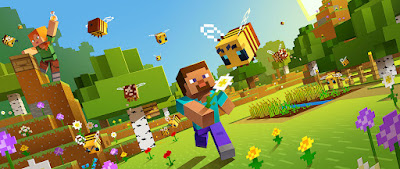Update: I'm adding an eleventh item to the list because I just have to add curing zombie villagers as #3.
11. Tridents
At face value, you might assume swords are the best offensive weapon in the game. However, anyone who runs into a drowned with a trident might tell you otherwise. Tridents are certainly harder to come by--you'll probably have to find a few and fix them--but they do more damage. Also, they can be enchanted with Loyalty which turns them into a ranged weapon you can throw.
10. Ender Pearls
Once you have a decent weapon and armour, you can get ender pearls relatively easily. Yes, you have to fight Enderman to do it, but you can win that fight. Ender pearls are incredibly powerful because they allow you to almost instantly teleport away from where you are. They are also one of the most effective defensive techniques in the game. If you get into trouble simply chuck a pearl and you'll be out of danger.
Note: you can't throw an Ender pearl out of lava. I tried that once... but only once. 😉
9. Charcoal
Most people agree the very first thing you should do when you start a new world is to cut down a tree. This gives you wood for your first tools and you can get to work making stone tools, and then iron tools after that. However, the one functionality of wood that I underestimated is making charcoal. If you build a furnace quickly and cook logs, you get charcoal that you can use to make torches. Once you have torches, instead of hiding from mobs all night, you can use that time to start digging a mine and speed up your ability to find iron, lava, diamonds, and a lot of other useful resources.
8. Trading to get experience points
It's surprisingly lucrative to trade with villagers. Yes, you get emeralds (or other items), but you also get experience points. If you breed villagers and put down the right work blocks for them, you can trade everything from rotten flesh to stone.
7. Spelunking
At the beginning of the game (when you don't have durable tools), this is by far the best option for gathering iron and coal. Strip mining might be more thorough, but exploring caves doesn't require anywhere near the mining time and you can quickly examine a lot of blocks.
6. Lava as fuel
Look it up, a bucket of lava can cook/burn more than any other fuel type. This allows you to save your coal for torches and trading with villagers.
5. Enchanting and combining books
Books can even be combined to raise their enchantments. For example, if you combine two Fortune I books into one Fortune II book.
4. Automatic sugarcane farms
Before I learned to build automatic sugarcane farms, leveling up villagers was a colossal pain in the chest plate. But now that I've tried them, I'm completely sold. I would never bother leveling up librarians without sugarcane farms again.
Note: use CrunchBase to make sure you don't build your Redstone machines on chunk boundaries. If you build on a boundary, your machine will keep breaking--which is awful. However, it's easy to figure out where the boundaries are and avoid them.
3. Curing Zombie Villagers
In my last world, I decided to try curing villagers instead of breeding them. Wow! What a difference. The discounted prices for trades are a game changer.
I had cured villagers before, but only out of necessity when I didn't have two to breed. I always figured the golden apple requirement wasn't worth the gold--when I could be using that gold to build powered rails. But now gold is easier to acquire and it's definitely worth it. The difference for librarians alone is enough to justify it (I don't even really need an automatic sugarcane farm anymore), but when you add in all the trades for the armourers and the blacksmiths (and others), it's just such a resource saver.
2. Enchanting for durability
I assume this is the biggest "no brainer" on this list, but I'd like to clarify exactly what I mean. Obviously, enchanting is great. However, what I didn't realize when I first started playing was just how key it is to get an enchanting table as fast as possible. The difference between using 'unbreaking' enchanted pick axes and vanilla ones can be the difference between constantly needing iron for tools, and using your iron ore for something else. When I start a new world, I dig down to around level 11 and start looking for diamonds. As soon as I find iron, I can make a bucket and take water down with me. Then, it's a simple matter of finding lava and using my water to create obsidian. Most likely, this is all easier than finding diamonds, but as soon as I do find them, I can make a diamond pickaxe (to mine the obsidian) and an enchanting table.
1. Fishing
A lot of people find fishing boring, but that wasn't why I initially undervalued its potential. At the beginning of a world, you get so much value from fishing. You can fish out experience points, food, saddles, enchanted books, enchanted fishing rods, and enchanted bows. The enchanted bows are probably the most important as you can get an infinity bow without an enchanting table. When you don't have much, an infinity bow is literally a game-changer.
Note: remember that fishing at night in the rain is the most efficient. So build a platform above water so mobs can't get you and fish at night.
That's my list. I hope you found it helpful.

